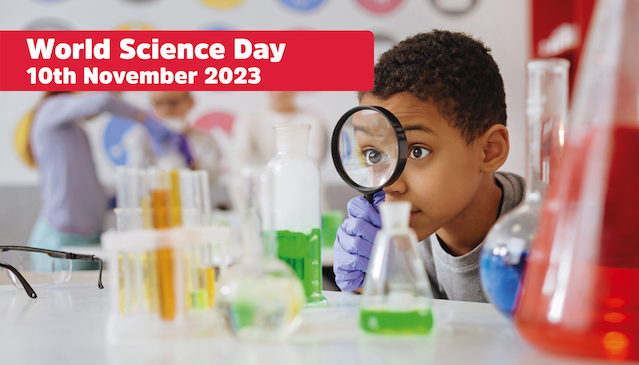Primary Times - the definitive what’s on and where to go family guide of activities and events for children of primary school age. Things to do with your kids during the school holidays including arts and craft activities, music and theatre for children, parties, competitions, days out, and family attractions along with term time drama schools, dance classes, after school clubs and sports activities. Things to do at a place near you!
Inspire young minds with spectacular science
 Primary Times explores the role that science and technology play in our everyday lives, as well as looking at how to encourage the next generation of scientists.
Primary Times explores the role that science and technology play in our everyday lives, as well as looking at how to encourage the next generation of scientists.
World Science Day 2023
World Science Day takes place on the 10th November. It’s a day to recognise and celebrate the role that science plays all around us. It also aims to make science more accessible for all, to inspire others and to share goals and values that hopefully work towards everybody’s greater wellbeing. To honour this day, Primary Times are putting science itself under the microscope and looking at how to make scientific topics fun for all the family!
How does science impact us day-to-day?
Science and technology are vital in today’s world, influencing most aspects of daily life. Sometimes we might take this for granted, not even realising that we’re using scientific thought or principles to carry out everyday tasks. From something as simple as boiling the kettle to make a cup of tea, to the way that we can travel and get around, science can be found everywhere.
The benefits of scientific discovery
Science is rooted in a desire to ask questions about the world and to try to find out the answers. Throughout human history, scientific research has led to the discovery of many important things. It generally seeks to try move humanity forwards, transforming the way that we do things.
Some benefits include:
• Breakthroughs in the study of the natural world and in medicine and treatment of diseases
• Technological advancements e.g. computers, smart phones, cars, the internet
• The ability to investigate the possibility of life on other planets
• Inventions and new discoveries such as artificial intelligence
Fun activities for families and budding young scientists
Children can learn a lot through their daily activities. Science revolves around wanting to understand more about the world and this can help children to channel their inner curiosity.
The primary curriculum looks at topics such as trees and plants, the human body, magnets, forces and electricity, planets and the solar system, and animals and their habitats and characteristics.
Here are some tips and tricks to get your children excited about science…
Read books or watch films on scientific topics
Concentrate on topics that your child is interested in. For children into fantasy and wacky ideas, you could read up on how objects fly or about how rainbows are formed. For animal lovers, watch a film together on different animals or a documentary that explores different climates, like the rainforest or the Arctic.
Dress-up play
Pretend you’re off for a day’s work in the lab. Grab a white coat, some goggles, rubber protective gloves and your measuring spoons or magnifying glass to truly look and feel the part! You could even attempt some DIY experiments at home together. This is great for hands-on learners and fuels the power of children learning through play.
Join a club
Encourage your child to join the school’s science club, or gather their siblings and friends and start your own! Children can swap facts, share their enthusiasm and learn from one another. Developing critical thinking and problem-solving skills will be useful throughout their school journey and beyond.
Admire astronomy at night time
Looking up at the stars together gives the perfect opportunity to discuss space. Children can also observe and learn about the lunar phases at different points through the month, and ask questions about the planets and the solar system. Excellent for visual learners.
Explore your local area
Museums might be holding some family-friendly events to celebrate World Science Day, or visit your local libraries and community centres to see if you can have a go at some science-themed arts and crafts activities for children.
What will you be doing to celebrate this year’s World Science Day?
